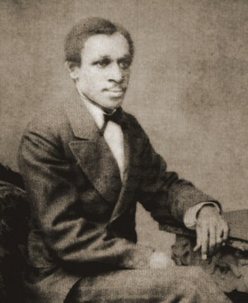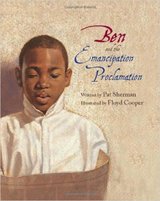__ “Excuse me, sir.” Ben tugged on the sleeve of a passing gentleman. “Does that say Broad Street?” He pointed to the wooden sign on the corner.
“Yes.” The man pulled away impatiently.
“And that other one, please. That’s King Street, right?” Ben studied the signs, trying to remember the letters. Broad. B-R-O-A-D, King, K-I...
“Boy?” The man had turned to stare at him. “Shouldn’t you be getting along?”
“Yes sir.” Ben threw his carrying sack over his shoulder and hurried away. Don’t let them know you can read. That’s what his father had told him. Slaves weren’t allowed to read.

Benjamin Holmes around age 25
__ In the years before the Civil War, African-American slaves in the South were forbidden by law from learning how to read. Twelve-year old Ben is lucky: his master has just apprenticed him to Mr. Bleeker, a tailor in the city of Charleston. There, Ben discovers all kinds of secret ways to learn how to read. He studies the labels on the tailor’s boxes of thread and buttons. While he runs errands, he memorizes street signs and the words he sees on the sides of wagons and in shop windows. Sometimes he picks up a copy of the city’s newspaper,The Charleston Mercury, that someone has tossed in the gutter. Then, when no one is looking, Ben sits down in his favorite hiding place beneath the branches of a big beech tree and reads. The pages of the Mercury introduce him to two important new words: "abolition" and "emancipation"--the end of slavery and freedom. Ben knows the editors of the Mercury don’t like these words at all, but to him they mean everything he has ever hoped for.
Ben even teaches himself to write, tracing the letters with his finger in the dust when he sweeps the tailor shop in the morning or writing in soap when he washes the windows. Soon other slaves in the city are begging him to teach them too. “Teach me,” they beg when he makes his deliveries. “Teach me," they ask everyplace he goes.
All this comes to a halt when war breaks out between the North and the South. Almost overnight Charleston is filled with soldiers in Confederate uniforms. Ben keeps his head down when he passes them He’s afraid to look at street signs and shop windows, now. He’s afraid to read. When Union troops draw near, Mr. Bleeker and his wife are forced to flee the city. They can’t take Ben with them, so his master sends him to a slave prison to await sale. The prison is a single large room crowded with men and boys. Everyone talks about the latest rumor that President Abraham Lincoln has issued an emancipation proclamation freeing the slaves. Can this be true, they wonder. And what does emancipation really mean? Ben doesn’t say anything. He’s convinced reading can only lead to trouble.
One night, a group men pool all their bits of tobacco together and bribe a guard for the latest copy of the Mercury.
“Read.” They jostled Ben awake. “We know you can read.”
By the light of a torch, Ben began to read. “The Message of Abraham Lincoln is to be found in this journal this morning...”
“Louder,” someone called out. “Stand Up.”
Slowly Ben stood up. Every men in the prison was awake, every face turned towards him. He drew a deep breath.
“On the first day of January, in the year of our Lord one thousand eight hundred and sixty-three...” His voice became stronger and clearer. “All persons held as slaves within any State or designated part of a State, the people whereof shall then be in rebellion against the United States shall be thenceforward, and forever free...”
Everyone broke into cheers. They stomped and clapped and didn’t care who heard. After a moment, Ben realized they weren’t just cheering for Abraham Lincoln; they were cheering for him too. For the first time in their lives they had heard a black man read out loud.
Discover More About Benjamin Holmes
Read a short biography of Benjamin Holmes
Learn about the history of the Emancipation Proclamation from the Library of Congress
Read the Emancipation Proclamation at the National Archives
Bake an Emancipation Day Breakfast Cake!
Download a discussion guide for teachers
Photo Credit: Fisk University
Ben even teaches himself to write, tracing the letters with his finger in the dust when he sweeps the tailor shop in the morning or writing in soap when he washes the windows. Soon other slaves in the city are begging him to teach them too. “Teach me,” they beg when he makes his deliveries. “Teach me," they ask everyplace he goes.
All this comes to a halt when war breaks out between the North and the South. Almost overnight Charleston is filled with soldiers in Confederate uniforms. Ben keeps his head down when he passes them He’s afraid to look at street signs and shop windows, now. He’s afraid to read. When Union troops draw near, Mr. Bleeker and his wife are forced to flee the city. They can’t take Ben with them, so his master sends him to a slave prison to await sale. The prison is a single large room crowded with men and boys. Everyone talks about the latest rumor that President Abraham Lincoln has issued an emancipation proclamation freeing the slaves. Can this be true, they wonder. And what does emancipation really mean? Ben doesn’t say anything. He’s convinced reading can only lead to trouble.
One night, a group men pool all their bits of tobacco together and bribe a guard for the latest copy of the Mercury.
“Read.” They jostled Ben awake. “We know you can read.”
By the light of a torch, Ben began to read. “The Message of Abraham Lincoln is to be found in this journal this morning...”
“Louder,” someone called out. “Stand Up.”
Slowly Ben stood up. Every men in the prison was awake, every face turned towards him. He drew a deep breath.
“On the first day of January, in the year of our Lord one thousand eight hundred and sixty-three...” His voice became stronger and clearer. “All persons held as slaves within any State or designated part of a State, the people whereof shall then be in rebellion against the United States shall be thenceforward, and forever free...”
Everyone broke into cheers. They stomped and clapped and didn’t care who heard. After a moment, Ben realized they weren’t just cheering for Abraham Lincoln; they were cheering for him too. For the first time in their lives they had heard a black man read out loud.
Discover More About Benjamin Holmes
Read a short biography of Benjamin Holmes
Learn about the history of the Emancipation Proclamation from the Library of Congress
Read the Emancipation Proclamation at the National Archives
Bake an Emancipation Day Breakfast Cake!
Download a discussion guide for teachers
Photo Credit: Fisk University

Click on the book cover to purchase your copy.